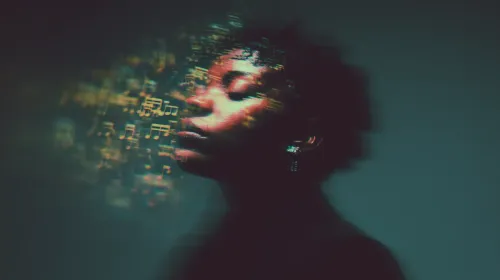Mississippi poet Telisha Jones just turned her lyrics into a $3 million record deal using nothing but AI—and it's exactly what independent creators have been waiting for.
Meet Xania Monet, the R&B artist who doesn't exist but just landed one of the biggest deals in AI music history. Behind the voice is Jones, a 31-year-old poet from Olive Branch, Mississippi, who took her personal stories, fed them into Suno's AI platform, and watched as her creation climbed to #1 on Billboard's R&B Digitalong Sales chart. In just one week, she generated 5.4 million streams.
The kicker? Jones admits she's not a "vocal beast"—she grew up singing in churches but knew her natural voice wouldn't land a record deal. So she did what any smart creator in 2024 would do: she found another way.
Why This Moment Matters for Every Songwriter
Here's what makes this story revolutionary: Jones writes every single lyric herself. About 90% of Xania's songs come directly from her personal experiences and community stories. She's not letting AI do the creative heavy lifting—she's using it as her voice, her vehicle, her democratizing force.
This is the future knocking on your door. For decades, the music industry has been gatekept by vocal ability, expensive studio time, and industry connections. Suno just obliterated those barriers.
Think about it: How many brilliant lyricists have incredible stories to tell but lack the vocal chops or financial resources to break through? How many poets, writers, and storytellers have been sitting on the sidelines because they couldn't afford studio time or didn't have "the voice"?
That era just ended.
The Suno Revolution: Your Creative Playground
Suno isn't just another AI tool—it's a complete creative ecosystem. The platform can take your lyrics and transform them into full songs with vocals, instrumentation, and professional production quality. Whether you want pop, R&B, rock, or gospel, Suno handles the entire musical arrangement while you maintain complete creative control over the message.
The platform offers multiple tiers, from free access to Pro ($8/month) and Premier ($24/month) subscriptions. Compare that to traditional studio costs—we're talking about democratized music creation for the price of a streaming subscription.
And here's the business beauty: Jones owns full rights to her creations. She maintains songwriting and production credits while Suno provides the technological backbone. It's partnership, not replacement.
The Industry Is Taking Notice (And Some Are Scared)
The backlash tells you everything about how disruptive this is. Grammy-nominated artist Kehlani deleted a TikTok video criticizing AI in music, saying "Nothing and no one on earth will ever be able to justify AI to me". SZA expressed similar concerns about AI devaluing music
But here's what they're missing: This isn't about replacing human creativity—it's about amplifying it. Jones still writes every word, crafts every story, and pours her authentic experiences into each song. Suno just gives her the technical capabilities she couldn't afford otherwise.
Even Timbaland, Suno's strategic advisor, is championing this movement. He posted about Xania Monet "killing it" and has signed his own AI artist under his entertainment company Stage Zero.
Your Window Is Open Right Now
While major labels are pulling back from Suno artists due to ongoing copyright lawsuits, independent labels like Hallwood Media are doubling down. They've now signed two AI artists from Suno, recognizing that this technology isn't going anywhere—it's only getting better.
Suno just released Version 5, their "most advanced music model yet", promising better audio quality, more natural vocals, and unprecedented creative control. They're also launching Suno Studio, an audio workstation that lets you add and remove individual song components like drums and vocals.
The tools are getting more powerful. The barriers are getting lower. The question is: What story do you want to tell?
The Real Opportunity for Creators
This isn't just about making money (though Xania Monet's success proves that's possible). This is about creative expression finally being divorced from technical limitations.
If you're a songwriter who's been held back by:
- Lack of vocal ability
- Expensive studio costs
- Technical production knowledge
- Industry connections
Suno just made all of those obstacles irrelevant.
Your lyrics, your stories, your authentic voice—that's what matters. The platform handles everything else. Whether you're writing about heartbreak, social justice, personal triumph, or community struggles, AI can now be your amplifier, not your replacement.
Jones proved something profound: authenticity still wins. Her song "Miscarriage Blues" has comment sections filled with grieving mothers finding comfort in her words. Real human experiences, expressed through AI assistance, creating genuine emotional connections.
What This Means Moving Forward
The music industry is experiencing a seismic shift, and you're witnessing it in real-time. AI isn't killing creativity—it's democratizing it. The same way social media gave everyone a publishing platform, AI music tools are giving everyone a recording studio.
Major labels might be hesitant now, but remember: they were also skeptical of streaming, social media marketing, and digital distribution. Early adopters win in these transitions.
So here's my challenge to you: If you've got stories to tell, lyrics in your notebook, or experiences that need to become songs—stop waiting for permission. Stop waiting for vocal lessons, studio access, or industry connections.
Download Suno. Start experimenting. Tell your truth.
Because if a poet from Mississippi can turn her words into a $3 million deal using nothing but AI and authentic storytelling, imagine what you could create.
The future of music isn't about perfect voices or expensive equipment. It's about perfect stories, perfectly told. And right now, that future is waiting for your words.

